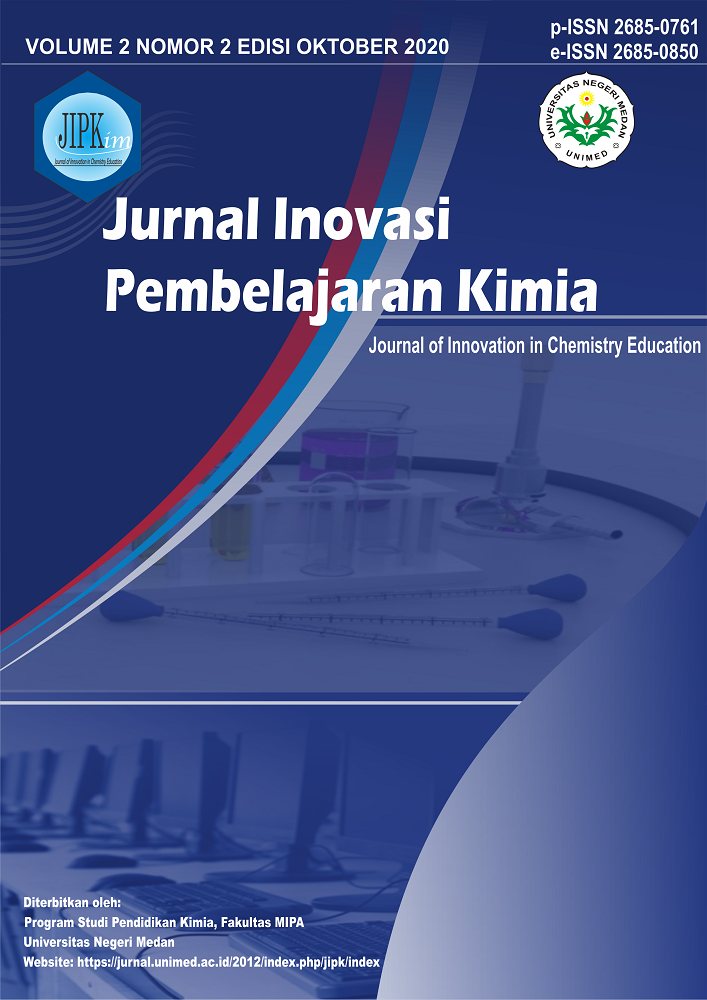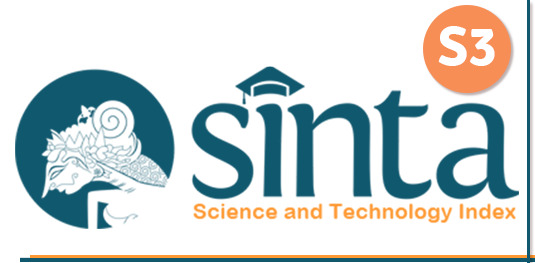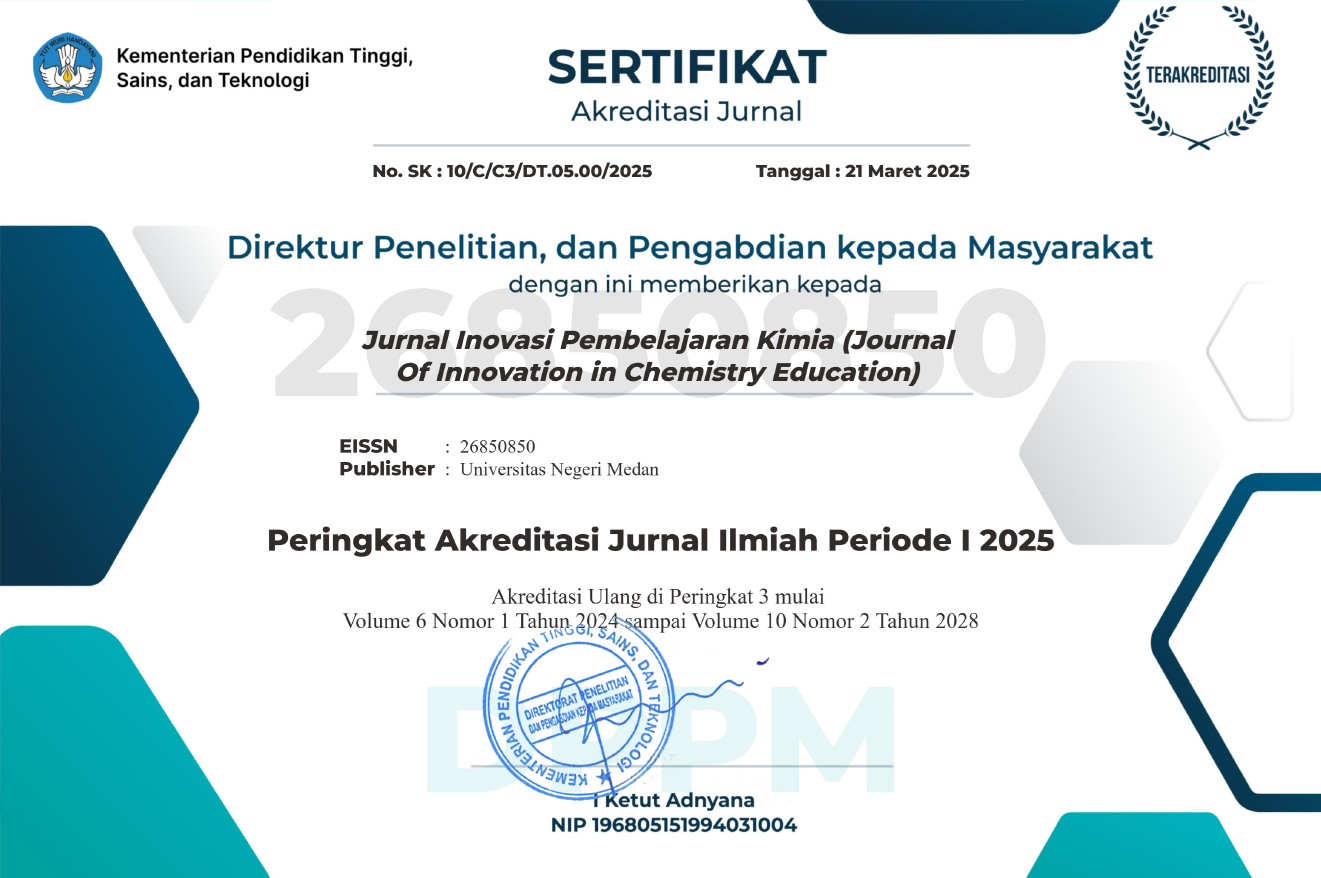Pengaruh Model Pembelajaran PBL Terhadap Aktivitas Belajar Dan Hasil Belajar Siswa Pada Materi Asam Basa
DOI:
https://doi.org/10.24114/jipk.v2i2.19571Keywords:
Problem Based Learning, Learning Outcomes, Learning ActivitiesAbstract
The objectives of this study is (1) to determine whether the learning activities of students who were taught with the Problem Based Learning model were higher than those of students who were taught using the Direct Instruction learning model (2) to determine whether the learning outcomes of students who were taught with the Problem Based Learning model is higher than the learning outcomes of students who are taught with the Direct Instruction learning model (3) to determine whether there is a correlation between student learning activities and student learning outcomes. The research instrument consisted of test instruments and non-test instruments. The analysis technique used is the right side test and correlation test or test (product moment). From the results of data analysis of learning outcomes obtained (1) student learning activities that were taught with the Problem Based Learning learning model (86,20) were higher than the learning activities of students who were taught with the Direct Instruction learning model (79,86) (2) learning outcomes students who are taught with the Problem Based Learning model (83.75) are higher than the learning outcomes of students who are taught with the Direct Instruction learning model (71.94) (3) there is a positive and significant correlation between student learning activities and student learning outcomes. taught by the Problem Based Learning model, the contribution of student learning activities to learning outcomes was 21.92% while 78.08% was caused by other factors.References
Azmy, M. K., Purwoko, A. A., & Hadisaputra, S. (2018). The Development Of Chemistry Teaching Materials In The Form Of HandoutsBased (PBL)In Class XI IPA Madrasah Aliyah (Ma) Kediri District. Journal of Research & Method in Education , 8 (3), 71-73.
Baskoro, F., Saputro, S., & Hastuti, B. (2013). Upaya Peningkatan Aktivitas Dan Prestasi Belajar Dengan Model Pembelajaran NHT (Numbered Head Together) Dilengkapi LKS Pada Materi Termokimia Siswa Kelas XI IPA-3 SMA Negeri 6 Surakarta. Jurnal Pendidikan Kimia , 2 (2), 85-91.
Budiningsih, A. (2012). Belajar dan Pembelajaran. Jakarta: PT Rineka Cipta.
Desriyanti, R., & Lazulva. (2016). Penerapan Problem Based Learning Pada Pembelajaran Konsep Hidrolisi Garam Untuk Meningkatkan Hasil Belajar Siswa. Jurnal Tadris Kimiya , 1 (2), 70-78.
Hamalik, O. (2006). Proses Belajar Mengajar. Jakarta: PT Bumi Aksara.
Kardi, S., & Nur, M. (2009). Pengajaran Langsung. Surabaya: University Press.
Munandar, H., & Syam, H. (2017). Penerapan Model Berbasis Masalah Pada Materi Pokok Asam Basa Untuk Mengembangkan Nilai-Nilai Karakter Siswa Kelas XI IPA 3 SMA Negeri 1 Parepare. Jurnal Sainsmat , VI (2), 10-17.
Nuryanto, Utami, B., & Nugroho, A. (2015). Penerapan Model Pembelajaran Problem Based Learning (PBL) Dilengkapi Macromedia Flash Untuk Meningkatkan Kemampuan Berpikir Kritis Dan Prestasi Belajar Siswa Pada Materi Pokok Termokimia Kelas Xi Siswa SMA Negeri 2 Karanganyar Tahun Pelajaran 2014/201. Jurnal Pendidikan Kimia (JPK) , 4 (4), 87-94.
Purwanto, N. (2007). Psikologi Pendidikan Remaja. Bandung: Rosdakarya.
Romadhoni, I., Mahardika, K., & Harijanto, A. (2017). Penerapan Model Pembelajaran Problem Based Learning (PBL) Disertai Media Cd Interaktif Terhadap Hasil Belajar Dan Aktivitas Belajar Siswa Pada Pembelajaran Fisika SMA Di Kabupaten Bondowoso. Jurnal Pembelajaran Fisika , 5 (4), 329 - 336.
Trianto. (2009). Mendesain Model Pembelajaran Inovatif-Progresif. Jakarta: Prenada Media.
Utami, T. S., Santi, D., & Suparman, A. R. (2018). Pengaruh Model Pembelajaran Problem Based Learning (PBL) Terhadap Hasil Belajar Kognitif Peserta Didik Kelas XI SMK Negeri 02 Manokwari. Chemistry Education Journal , 21-26.
Wulandari, B., & Surjono, H. D. (2013). Pengaruh Problem-Based Learning Terhadap Hasil Belajar Ditinjau Dari Motivasi Belajar PLC Di Smk. Jurnal Pendidikan Vokasi , 3 (2), 178-191.













